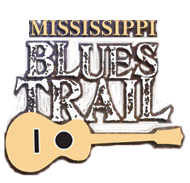Charles Evers
Charles Evers - Fayette
In 1973 Mayor Charles Evers of Fayette and B. B. King began to cosponsor concerts at the Medgar Evers Homecoming in honor of the slain civil rights activist. Dozens of blues, soul, and gospel acts performed at the annual festival during subsequent decades. Charles Evers’s formal involvement in blues began in 1954 when he became one of the first African American deejays in Mississippi at WHOC in Philadelphia. In 1987 he began a long tenure as manager of WMPR in Jackson.
Evers, an entrepreneur, civil rights leader, and politician, was born in Decatur, Mississippi, on September 11, 1922, three years before his brother, activist Medgar Evers. Following service in World War II the brothers attended Alcorn Agricultural and Mechanical College (later Alcorn State University), where they became involved in civil rights activities. In 1951 Charles Evers moved to Philadelphia, Mississippi, where he worked at a family-run funeral home and operated a taxi service, a bootleg liquor business, and the Evers Hotel and Lounge, which featured blues bands. After the funeral home advertised on WHOC radio, station owner Howard Cole asked Evers to start hosting a show himself. Evers played blues records and also encouraged his African American listeners to register to vote. His brother Medgar took a position with the NAACP in Jackson and became Mississippi’s most prominent civil rights figure. In Philadelphia, segregationist threats to Charles Evers’s businesses and family became so severe that he moved his family to Chicago in 1956.
In Chicago Evers was industrious in both legitimate businesses and vice, as he candidly described in his autobiography, Have No Fear: A Black Man’s Fight for Respect in America. His nightclubs, the Club Mississippi and the Subway Lounge in Chicago and the Palm Gardens in the suburb of Argo, featured Mississippi-born blues artists such as Muddy Waters, Elmore James, and B. B. King. After Medgar Evers was assassinated in Jackson on June 12, 1963, Charles Evers returned to his home state, where he succeeded his brother as field secretary of the NAACP. Evers organized boycotts, protests, and registration campaigns, and in 1969 Fayette elected him as the first African American mayor of a racially mixed town in Mississippi in the post-Reconstruction era.
To commemorate the tenth anniversary of the murder of Medgar Evers, B. B. King encouraged Charles Evers to found the annual Medgar Evers Homecoming, which featured several days of concerts, parades, and other activities in Fayette and Jackson. Over the following decades the multi-day celebration, also known as the Mississippi Homecoming, took place in various locations across the state including the Evers-owned nightclubs the Fountain Lounge in Fayette and the E&E Lounge in Jackson, as well as his Tri-County Park in Pickens. In addition to annual visits by King and lineups of leading blues, R&B, and gospel acts, celebrities including Muhammad Ali, Kris Kristofferson, Shirley MacLaine, and Dick Gregory participated in the events. Under Evers’s management Jackson public radio station WMPR became a primary outlet for blues in both its musical programming and sponsor-underwritten concert and festival announcements, while Evers continued to address political issues on his long-running show, “Let’s Talk.”
content © Mississippi Blues Commission
[ BACK TO TOP ]

